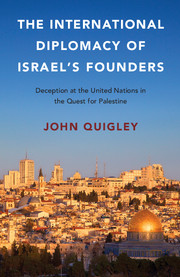 The International Diplomacy of Israel's Founders
The International Diplomacy of Israel's Founders Book contents
- Frontmatter
- Contents
- Preface
- A Note on United Nations Committees
- Abbreviations
- 1 A Public Relations Imperative
- 2 Promises, Promises
- 3 Pranks in Paris and Geneva
- 4 Courting the Commissar
- 5 Saving Europe's Jews – Our Way
- 6 Smoke and Mirrors at the YMCA
- 7 The Ship that Launched a Nation
- 8 Cocktails at the Consulate
- 9 Causing Chaos
- 10 Denying the Undeniable
- 11 A Peace-Loving State?
- 12 Joining the World with Fingers Crossed
- 13 Israel: 1, United Nations: 0
- 14 A Phantom Attack
- 15 Sabras in Sinai: Pardon My French
- 16 Suez Smoke-Screen
- 17 Mr. Nasser, Please Attack
- 18 Abba Eban's Finest Hour
- 19 Old Issues, New Lies
- 20 An Organization Turned Sinister
- 21 Prevarication Pays
- Notes
- Bibliography
- Index
16 - Suez Smoke-Screen
Published online by Cambridge University Press: 05 January 2016
- Frontmatter
- Contents
- Preface
- A Note on United Nations Committees
- Abbreviations
- 1 A Public Relations Imperative
- 2 Promises, Promises
- 3 Pranks in Paris and Geneva
- 4 Courting the Commissar
- 5 Saving Europe's Jews – Our Way
- 6 Smoke and Mirrors at the YMCA
- 7 The Ship that Launched a Nation
- 8 Cocktails at the Consulate
- 9 Causing Chaos
- 10 Denying the Undeniable
- 11 A Peace-Loving State?
- 12 Joining the World with Fingers Crossed
- 13 Israel: 1, United Nations: 0
- 14 A Phantom Attack
- 15 Sabras in Sinai: Pardon My French
- 16 Suez Smoke-Screen
- 17 Mr. Nasser, Please Attack
- 18 Abba Eban's Finest Hour
- 19 Old Issues, New Lies
- 20 An Organization Turned Sinister
- 21 Prevarication Pays
- Notes
- Bibliography
- Index
Summary
Beginning October 31 and continuing the next several days, France and Britain initiated military action against Egypt. They engaged Egyptian fighter aircraft. Paratroopers descended on Egyptian soil. Cairo was bombed. British-French action following so quickly upon Israel's invasion fed suspicion of collusion among the three states. The Soviet Union said that the whole operation was concocted. “Israel's aggression, like the aggression of the United Kingdom and France against Egypt,” delegate Arkady Sobolev said, “is being carried out in accordance with a single, previously prepared plan.” Sobolev said “that Israel's aggression was planned in order to create conditions favourable for the seizure of the Suez Canal by the armed forces of the United Kingdom and France.”
France and Britain held to their script. Dixon said that “the Egyptian Government regrettably has rejected the communication from Her Majesty's Government and from the French Government dated 30 October, and as a consequence Her Majesty's Government and the French Government have intervened in accordance with that communication.” Britain described the objectives of the French–British intervention as being “to stop all warlike action on land, sea and air as soon as possible; secondly, to enforce a separation of the belligerents; and thirdly, to protect the Suez Canal for the free passage of ships of all nations.”
France, too, continued to play its role, declaring, “We were confronted with an attack by the forces of Israel in the Suez zone heading towards the Canal. We had every reason to believe that the military developments arising out of this action might reach the point where free passage through the Canal would be impeded. The latest news received from Egypt, which reports the position of the Israel troops, shows how well our fears were justified.”
The Security Council, unable to adopt a resolution because of the French and British vetoes, voted to convene an emergency special session of the General Assembly. Britain and France voted against convening the Assembly, but on procedure the veto does not apply.
MORE FICTION IN THE GENERAL ASSEMBLY
The General Assembly took up the crisis. It met the next day, November 1. Israeli forces were still in Sinai, and the British-French force was now on the ground near the Suez Canal. For the United States, eager to stop the military action, the advantage of operating in the General Assembly was that each member state has an equal vote.
- Type
- Chapter
- Information
- The International Diplomacy of Israel's FoundersDeception at the United Nations in the Quest for Palestine, pp. 173 - 185Publisher: Cambridge University PressPrint publication year: 2016


